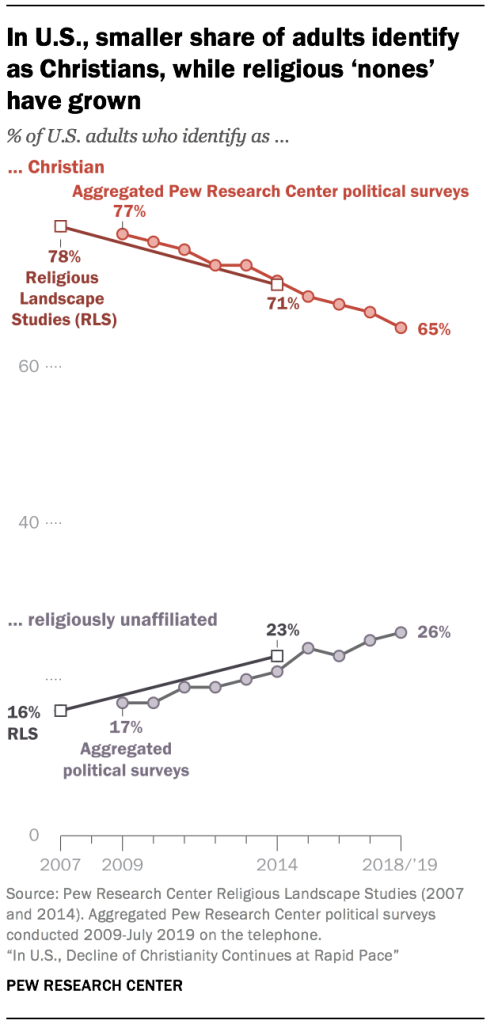I have recently been thinking of the 26% who declare affiliation with “none” of the theistic beliefs in the Pew Center poll, along with a related group called “spiritual, but not religious.” How do church people regard them and how could we make them welcome in our midst?
There were no Pew surveys in Jesus’ time, so there were no “none’s.” There were, however, “tax collectors and sinners,” as Jesus noted, quoting his critics “Look, a glutton and a drunkard, a friend of tax collectors and sinners” (Matt 11:19). Jesus called a tax collector to be his disciple and he went to the home of Zaccheus, a tax collector, inviting the criticism he received from the Pharisees. He owned the title “friend of tax collectors and sinners.”
Could the “none’s” be a stand-in for tax collectors and sinners? Well, the name “sinners” is harsh and judgmental, but the tax collectors were Jews known as lackeys of the Roman Empire and renegades against the religion. According to Crudens’ Concordance,
They were especially detested by the Jews, not so much on account of their frequent dishonesty, but because they were paid servants of the hated Romans. They were therefore considered as traitors and apostates (520).
The roles of “traitors and apostates” resonate somewhat with the “none’s” who are currently growing, in some cases, by leaving the churches. The path from church-goer to “none” is not documented, but many baby-boomer families can attest to their children or grandchildren leaving the church after adolescence, possibly populating the class we know as “nones.” Perhaps, too, this class has gained status by being recognized for years by Pew studies .
The “spiritual, but not religious” (SBNR) identification has a longer history than the Pew study, but it probably overlaps with the “none’s. ” “SBNR as a movement in America was delineated by author Sven Erlandson
in his 2000 book “Spiritual but not Religious”.[8][9][10] The phenomenon possibly started to emerge as a result of a new Romantic movement that began in the 1960s, whereas the relationship between the two has been remotely linked to William James‘ definition of religious experience, which he defines as the “feelings, acts and experiences of individual men in their solitude, so far as they apprehend themselves to stand in relation to whatever they may consider the divine.” [Erlandson, Sven (2000). Spiritual but Not Religious: A Call to Religious Revolution in America. Bloomington: iUniverse. ISBN 059501108X]
Both the “none’s” and the “spiritual, but not religious” could include people who left the church over dogma and bureaucracy, rather than complete abandonment of faith. They could easily argue the church left them behind, as much as they left the church.
I don’t think the church today has the same resentment of nones and SBNR’s, but some may see them as apostates, lacking spirituality. When the pious refer to the United States as a “Christian nation,” they make the “none’s” second-class citizens. Churches may regard the none’s as both apostate and unpatriotic. In such pronouncements we see a widening gap between the Christian church and the “none’s” just when the church needs their thoughtful energy.
The alienating terms, such as “apostate,” “backslider,” “doubter,” or “sinner” need to go. Like so many polarizing terms in our society, they prevent dialog and undermine respect we should have for people who are seriously inquiring into their beliefs. In some cases the difference between a believer and non-believer is the degree of certainty believers have that non-believers lack. We can create barriers by merely asserting we are right, and no one can ever prove us wrong. It is an attitude as much as it is the content of our belief that divides us.
Why was Jesus regarded as a friend of “sinners and tax collectors?” Because he ate and drank with them and presumably listened to them. These men who worked for the Roman Empire and extracted money from their fellow Jews were friends of this Jew who was believed to be a prophet. He was not judgmental. Jesus did not even quarrel about the right to collect taxes. Remember his adage “Render unto Caesar the things that are Caesar’s . . . ” (Matt 22:21).
“Being kind rather than right” should be our motto (Silver Linings Playbook). We can defend our beliefs at the appropriate moment, but we should do it in the spirit of dialog. This means granting others integrity and sincerity, not belittling their status as skeptics or questioners. We may be divided by categories on surveys, but that should not prevent us from reaching across categories for thoughtful dialog.


Amen!